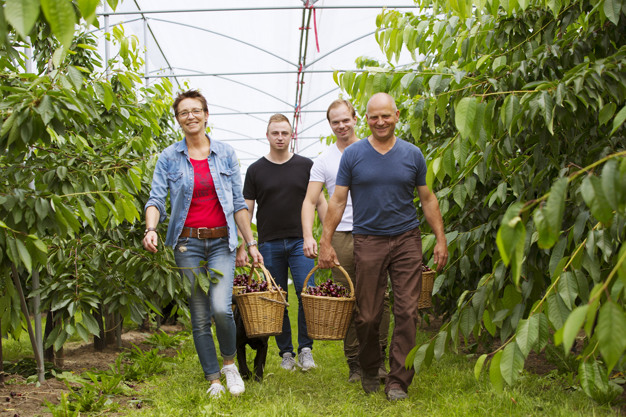Over the past eleven years, the traditional pear orchard owned by the Hakkert family in Buren has gradually been replaced by a modern cherry plantation. On Monday, Megakers VOF kicked off the cherry harvest. In contrast to many other Dutch growers, the grower can look forward to a large harvest. "We're on the right side of the line. Our harvest is superb, but nationally it's a disaster," says Roeland Hakkert.

"This year, you can clearly see which cherries are planted on prime soil. There are plots where more than half of the trees are dead. Wherever water remains on the land, it hits. Especially in the cultivation on the wetter soils, shedding has been extreme, resulting in very few plots being full. I have my doubts whether there will be more cherries this year than the disaster season last year. Therefore, it's almost inevitable that cherries will remain well-priced. Currently, the top cherries are indeed very well-priced," the grower explains.
Hakkert grows cherries on about 10 hectares, of which 6 hectares are his own and 4 hectares are leased land. This year he has leased additional plots again, and he looks forward to the season with confidence. "I think there will be a shortage of good cherries. You know, now about 20% of the national cherry acreage consists of dead trees, but in addition, you have another 15% of the trees that now have small cherries on them and which I expect will still die. The cherry cultivation will really need time to recover and return to last year's level."
Kroon Kers
For several years, Megakers has been the main supplier of Postuma AGF from IJsselmuiden, which distributes the cherries under the Kroon Kers label mainly to specialty vegetable stores. A collaboration that stands firm. "I have always taken care of my distribution, but when my son joined the business three years ago, he wanted a fixed buyer. That's how we ended up at Postuma by chance. It started with loading a few pallets of Kordia and Regina, but they came back in the winter looking for a reliable supplier who could deliver in the higher segment throughout the season. For them, it's ideal; they can load 300 to 500 crates a day here and don't have to visit all the auctions anymore."
"It's our task to meet the expectations, and we are very strict about that. If I doubt the quality, then the cherries go in a different crate," Roeland shares. He is also not an early starter. "I have the patience of a saint. There are growers who started two weeks ago, but I don't make all those investments to then harvest just below top quality. We pick all plots three, four times and sell purely based on taste."
Additionally, the grower supplies cherries for export in luxury chocolate boxes to BE Fresh, which then exclusively supplies them to one customer per country. "For this, we package thirty cherries in a box with a special packing leaf and an explanation of our cultivation method. These packages are all sent by air freight. What we pick at 6.00 in the morning, goes directly to the depot at 10.00 and is on the airplane by 15.00. This way, our cherries are available for sale all over the world within 24 hours."
In addition, the cherry cultivation company has three sales points, one of which is at home, one in IJsselstein, and one in Driebergen. "It's easier for me to supply to the wholesale market, but I do it to accommodate the local people, who expect to be able to buy our cherries," Roeland explains.

Consumers want cherries of 3 cm plus
The season at Megakers traditionally runs until mid-August, by which time the company will have progressed through 32 varieties. "We've started with Burlat, but at our farm, the different varieties follow each other at lightning speed. Every two days, we're onto a new variety," the cherry grower says. "For us, it's important to deliver large cherries. Consumers simply prefer tasty cherries of 3 centimeters plus. They are willing to spend good money on them, while the smaller ones often struggle to sell."
"We grow about 90% organic. I don't want to switch to fully organic because I can't get enough flavor in my cherries to my liking if I can't feed them unlimitedly. Also, I wouldn't achieve the size grading. Ultimately, a tree is like a human; it only produces good cherries if it gets enough to eat. Our advantage is that we are one of the few growers who can also irrigate the black strips well, enabling us to deliver beautiful, large cherries."
Asked about the future of Dutch cherry cultivation, Roeland answers: "It depends on whether Caroline has negotiated well. If we get an agriculture minister from the BBB, then I have confidence in it, but if we get another one like Adema, then I see it grimly. He completely missed the connection with the agricultural sector. I am less pessimistic about the sale of cherries. We still grow only a fraction of Dutch consumption. There's plenty of market potential for good cherries. However, it's important that as you grow, you don't compromise on your quality standards."
 For more information:
For more information:
Roeland Hakkert
Megakers VOF
Aalswijksestraat 1
4116 RN Buren
Mob: 06-54216633
[email protected]
www.megakers.nl
